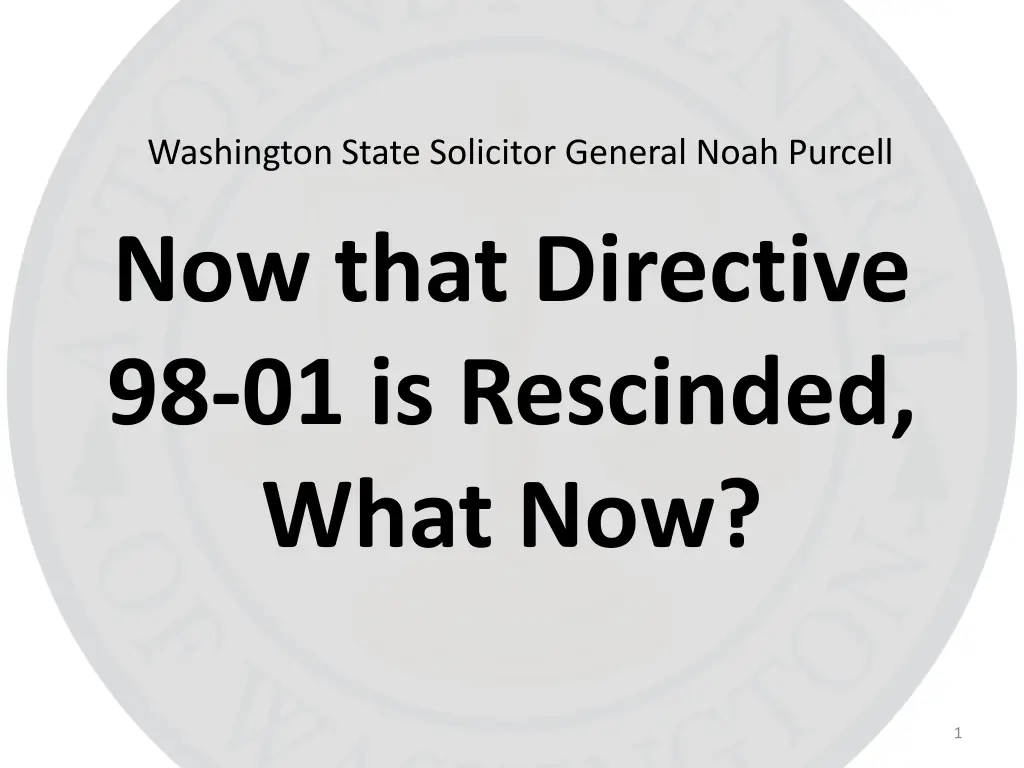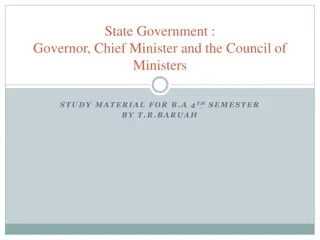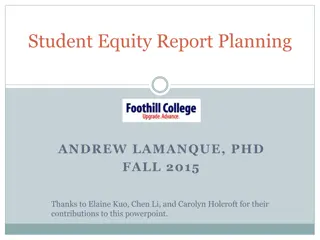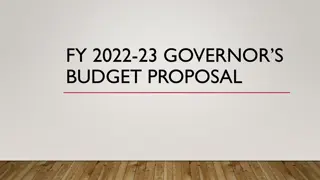
Affirmative Action Guidelines and Federal Law in Washington State
Explore the role of the Washington State Solicitor General, the status of affirmative action programs in WA, and the implications of federal law on contracting in the state. Learn about the commitment to diversity and equity, the limitations on affirmative action, and the requirements imposed by federal law.
Download Presentation

Please find below an Image/Link to download the presentation.
The content on the website is provided AS IS for your information and personal use only. It may not be sold, licensed, or shared on other websites without obtaining consent from the author. If you encounter any issues during the download, it is possible that the publisher has removed the file from their server.
You are allowed to download the files provided on this website for personal or commercial use, subject to the condition that they are used lawfully. All files are the property of their respective owners.
The content on the website is provided AS IS for your information and personal use only. It may not be sold, licensed, or shared on other websites without obtaining consent from the author.
E N D
Presentation Transcript
Washington State Solicitor General Noah Purcell Now that Directive 98-01 is Rescinded, What Now? 1
Role of the AGs Office Deep commitment to diversity, equity, inclusion Created Civil Rights Division Created Racial Equity Unit Significantly improved attorney diversity 2
Role of the AGs Office We control affirmative litigation, e.g., civil rights Primary role is advising and representing clients: hundreds of state agencies and boards In that role, we give advice, clients make policy We give options-based advice, explaining risks, not dictating what they do 3
Status of Affirmative Action in WA Affirmative action programs can be used but must be carefully designed Limitations come from state and federal law 4
Federal Law Pre-dates I-200 and applies to the state and all local governments in Washington Allows limited use of affirmative action in contracting, higher education, and hiring, but imposes stringent requirements [A]ll racial classifications, imposed by whatever federal, state, or local governmental actor, must be analyzed by a reviewing court under strict scrutiny. In other words, such classifications are constitutional only if they are narrowly tailored measures that further compelling governmental interests. Adarand Constructors, Inc. V. Pena, 515 U.S. 200, 227 (1995). 5
Federal Law on Contracting State must specifically identify the industry in which discrimination is occurring (broad categories are insufficient) and who is facing discrimination. While the States and their subdivisions may take remedial action when they possess evidence that their own spending practices are exacerbating a pattern of prior discrimination, they must identify that discrimination, public or private, with some specificity before they may use race-conscious relief. Croson, 488 U.S. at 504. 6
Federal Law on Contracting To meet the standards just described, the State can use a disparity study. State has conducted several disparity studies, and others are in progress or coming soon. 7
Federal Law on Contracting Race-conscious measures may only be used as a last resort. City of Richmond v. J.A. Croson Co., 488 U.S. 469, 519 (1989). Quotas are prohibited, but flexible goals are allowed if the standards above are met. 8
Federal Law Higher Ed Regents of University of California v. Bakke, 438 U.S. 265 (1978): Any racial classification is subject to strict scrutiny. Promoting diversity in higher education is a compelling interest, but quotas are not an acceptable approach. Race can be used as a plus factor. 9
Federal Law Higher Ed Fisher v. Univ. of Texas at Austin, 579 U.S. 365 (2016): Public universities can use affirmative action if they don t use quotas or fixed percentages and they show that race-neutral alternatives that are available and workable are insufficient. 4-3 decision, authored by Justice Kennedy. (Scalia had died, Kagan was recused.) 10
Federal Law Higher Ed Two cases pending at US Supreme Court attack use of affirmative action at Harvard and UNC WA joined 19 other states in supporting Harvard and UNC s affirmative action programs Court may overturn or limit prior decisions allowing affirmative action in higher ed 11
Federal Law on Hiring Under Title VII, employers may not discriminate against any individual with respect to compensation, terms, conditions, or privileges of employment, because of such individual s race, color, religion, sex, or national origin. Title VII prohibits the use of protected classifications as a motivating factor for any employment practice, even though other factors also motivated the practice. 42 U.S.C. 2000e- 2(m). 12
Federal Law on Hiring Employers can use race or gender as factors in hiring if doing so is necessary to avoid a disparate impact based on race or gender. Before employing race-conscious measures, employer must have a strong basis in evidence to believe they would otherwise violate Title VII s disparate impact rules. Ricci v. DeStefano, 557 U.S. 557 (2009). 13
State Law In 1998, Washington voters passed Initiative 200. I-200 said: The state shall not discriminate against, or grant preferential treatment to, any individual or group on the basis of race, sex, color, ethnicity, or national origin in the operation of public employment, public education, or public contracting. RCW 49.60.400(1). 14
State Law In the Voter s Pamphlet, I-200 supporters said: Initiative 200 does not end all affirmative action programs. It prohibits only those programs that use race or gender to select a less qualified applicant over a more deserving applicant. I-200 did not repeal preexisting statutes, like Chapter 39.19, authorizing affirmative action 15
State Law Governor Locke then issued Directive 98-01, interpreting and implementing Initiative 200. The Directive addressed contracting, hiring, and education. 16
State Law Directive 98-01 interpreted I-200 to mean: Race, sex, color, ethnicity and national origin may not be used in the final selection of a bidder for a public contract. Race, sex, color, ethnicity and national origin may not be used in the final selection of an applicant for public employment. Preferences in admissions based on race, sex, color, ethnicity and national origin should be discontinued. 17
State Law In 2003, the Washington Supreme Court interprets I-200 only to prohibit[] reverse discrimination where race or gender is used by government to select a less qualified applicant over a more qualified applicant. Parents Involved in Cmty. Schs. v. Seattle Sch. Dist. 1, 149 Wn.2d 660, 689-90, 72 P.3d 151 (2003). 18
State Law 2017: our Office issued AGO Opinion 2017 No. 2: The question: Does Initiative 200 prohibit the State from implementing race- or sex-conscious measures to address significant disparities in the public contracting sector that are documented in a disparity study if it is first determined that race- and sex-neutral measures will be insufficient to address those disparities? 19
State Law Our answer: Initiative 200 does not categorically prohibit all uses of race- or sex-conscious measures in state contracting. The measure allows the use of measures that take race or gender into account in state contracting without elevating a less qualified contractor over a more qualified contractor. In narrow circumstances, an agency may be allowed to use a narrowly tailored preference based on race or sex when no other means is available to remedy demonstrated discrimination in state contracting. State agencies may also employ race- or sex-based preferences when necessary to do so in order to avoid losing eligibility for programs providing federal funds. 20
State Law For example: For example, consistent with [I- 200], an agency could potentially rank applicants as exceptionally well qualified, well qualified, qualified, and not qualified, and use race or gender as a tiebreaker between applicants who fell within the same category. 21
State Law In 2022, Governor Inslee rescinds directive 98-01 and issues three new executive orders EXECUTIVE ORDER 22-01 (January 7, 2022) - Equity in Public Contracting Implements Measures for Equity in Public Spending for Cabinet State Agencies, including data collection, outreach efforts, and other steps EXECUTIVE ORDER 22-02 (January 17, 2022) - Equity in State Government Focuses on four main public sector areas: contracting, employment, education, and services EXECUTIVE ORDER 22-04 (March 21, 2022)- Implementing the Washington State Pro-Equity Anti-Racism (PEAR) Plan & Playbook Office of Equity to create Plan to bridge opportunity gaps and reduce disparities so everyone in Washington flourishes 22
State Law Governor Inslee s rescission of Directive 98-01 makes additional options available to agencies. Governor Inslee s order does not change federal law or eliminate I-200. 23
Bottom Line Federal law allows limited use of certain forms of affirmative action in state contracting, hiring, and higher education I-200 restricts the options available but does not eliminate the State s ability to use affirmative action I-200 allows use of affirmative action to select among equally qualified bidders/applicants, where there is no other way to remedy demonstrated discrimination, or where required by federal law Implementing affirmative action programs requires careful analysis and planning to withstand legal challenges 24
Questions? 25






















